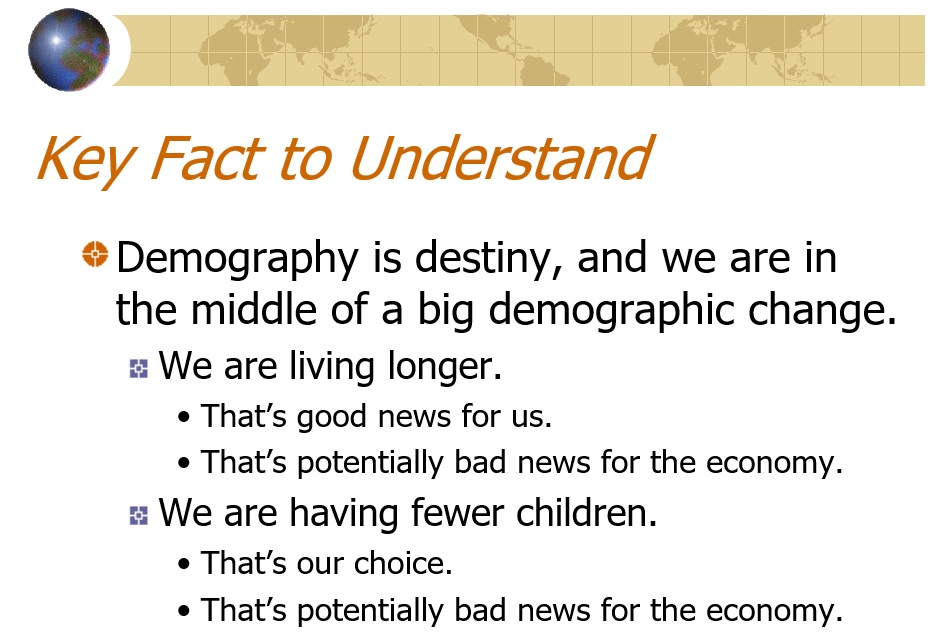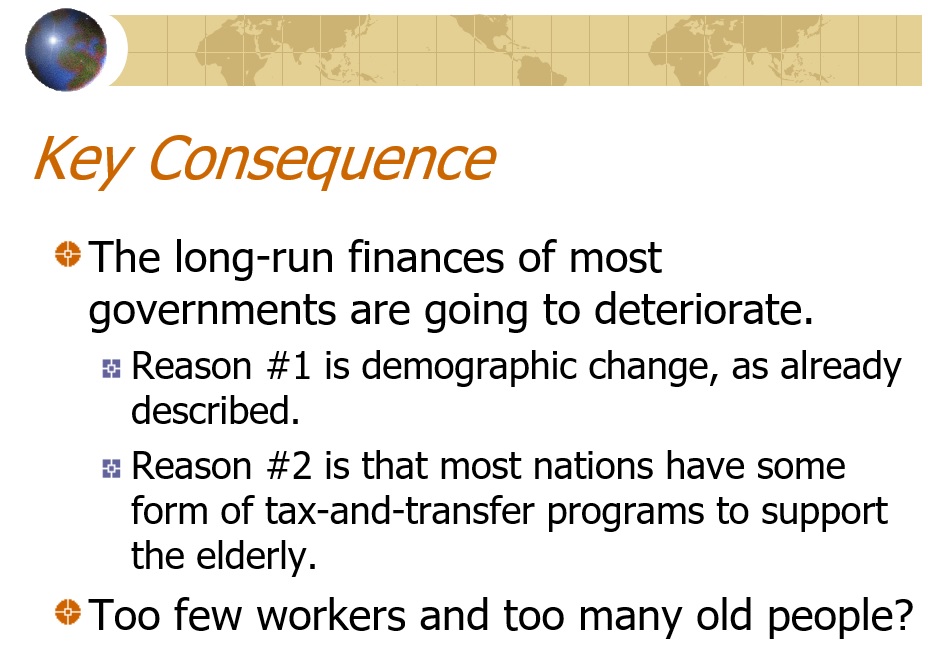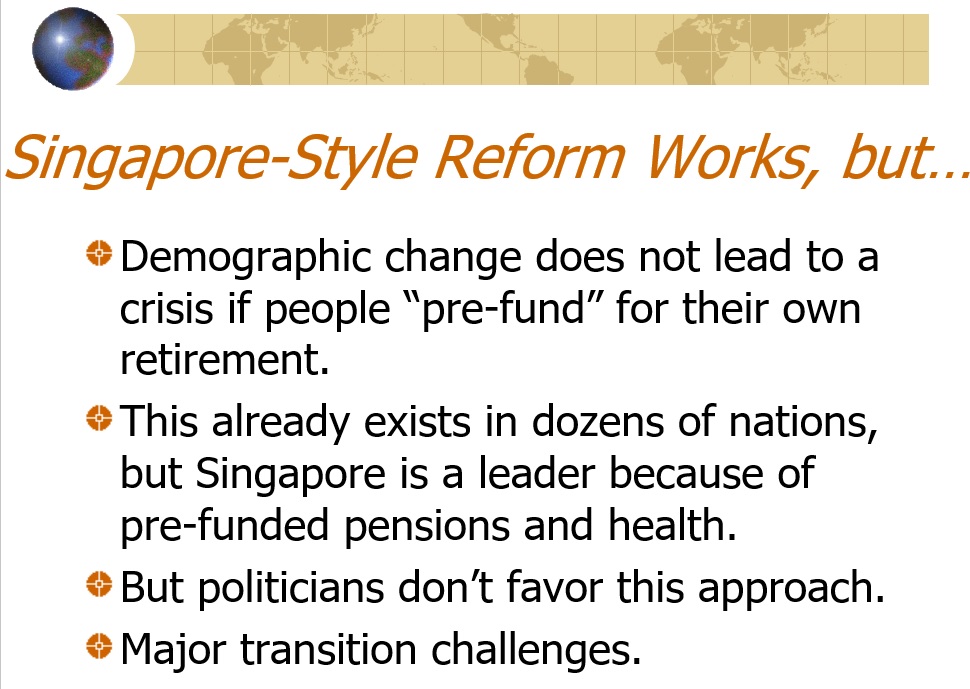I’ve written many times about demographic change and the implications for public policy – both in the United States and around the world.
Simply stated, it will be increasingly difficult to maintain tax-and-transfer entitlement programs in societies where people are having fewer children and people are living longer.
I’m raising this issue because I spoke on this topic earlier today at an e-symposium organized by Trends Research in Abu Dhabi, UAE. Here’s a slide with my main message.
Why is it bad news from an economic perspective?
As I noted in the next slide, tax-and-transfer entitlement programs for the elderly (most notably Social Security and Medicare in the United States) become harder to finance when there are lots of beneficiaries and too few taxpayers to support them.
So what’s going to happen in various nations when the irresistible force of more beneficiaries meets the immovable object of fewer taxpayers?
In my presentation, I pointed out that there are only three potential solutions.
- More taxes – A policy that Barack Obama, Hillary Clinton, and Joe Biden explicitly have embraced.
- More debt – A policy that politicians such as Donald Trump have implicitly embraced.
- Entitlement reform – A policy that some Republicans supported in the pre-Trump era.
I explained that higher tax burdens and higher debt levels would not be economically prudent.
The right approach is genuine entitlement reform, but I freely admitted that this “pre-funding” model probably won’t happen.
Here’s the relevant slide.
By the way, Singapore is the role model for pre-funding, but many other nations have adopted that approach for retirement income (such as Israel, Denmark, Switzerland, Hong Kong, Netherlands, Faroe Islands, and Sweden).
Unfortunately, most nations are heading for a demographic iceberg (including the U.S.) but I fear few of them will enact the reforms that are needed to avert a bad outcome.



[…] You can read my two-part series on this topic here and […]
[…] The retirement of the baby boom generation, combined with poorly designed old-age entitlements, translates to a higher spending trend […]
[…] You can read my two-part series on this topic here and […]
[…] lower levels of fertility have a profound impact on social-insurance systems, as explained in Part I and Part […]
[…] You can read my two-part series on this topic here and […]
[…] You can read my two-part series on this topic here and […]
[…] The current fiscal situation is bad, but remember that things will get much worse because of demographic changes such as population […]
[…] The current fiscal situation is bad, but remember that things will get much worse because of demographic changes such as population […]
[…] takeaway is that aging populations and poorly designed tax-and-transfer programs (entitlements) are a recipe for long-run fiscal crisis in almost all developed […]
[…] takeaway is that aging populations and poorly designed tax-and-transfer programs (entitlements) are a recipe for long-run fiscal crisis in almost all developed […]
[…] You can read my two-part series on this topic here and […]
[…] You can read my two-part series on this topic here and […]
[…] You can read my two-part series on this topic here and […]
[…] You can read my two-part series on this topic here and […]
[…] You can read my two-part series on this topic here and […]
[…] You can read my two-part series on this topic here and […]
[…] few days ago, I shared some slides from a presentation to an e-symposium organized by Trends Research in Abu […]
Reblogged this on boudica.us.
I think we are reaching a new era- where ‘old’ people can keep adding to the economy. reaching one hundred will not get you a telegraph from the queen, though reaCHING TWO HUNDRed might. There was a study in America where re-activating the thymus gland rejuvinated the person, so that they graduately became younger-looking. and seemed to be younger than their age. Perhaps we should adjust our societies to fit our new ages better?
Reblogged this on Gds44's Blog.
I invite you to consider a fourth possible outcome. Advancing technology could save the day, inspire of our spendthrift politicians. Advancing technology, which translates to increased productivity, is the only thing that has saved us from the profligacy of politicians so far.
Given the unfunded liabilities of the federal government, well over $100 trillion, we better hope for continuing advances in technology. If it doesn’t happen, we are doomed.
Japan is the outlier in this doom story, which is repeated by all official pundits. Nobody can explain how Japan keeps growing with less births and more elders reaching 100, plus a+200 Debt/GDP. With no immigration, it keeps churning surplus exports of automobiles and technological products. Watch NHK TV; you’ll see elder japanese are the backbone of PYMES throughout Japan.
For years I did not disagree much with Dan Mitchell. Then in the space of a couple weeks, I find him writing stuff that is absolutely wrong. For example, living longer and having fewer children is bad for the economy with tired and debunked arguments listed in support of those propositions.